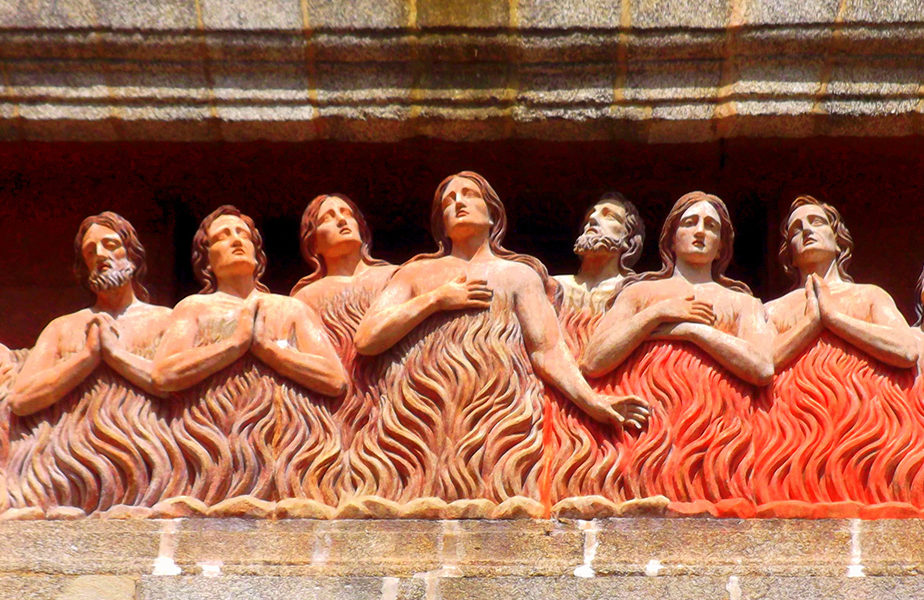Earlier this month I spoke at the annual conference of the Conditional Immortality Association of New Zealand, on divine holiness and hell. Defenders of the doctrine of eternal torment sometimes assure us that eternal torment in hell is necessary because God is very, very holy. But a biblical theology of God’s holiness actually offers no support at all to this view on hell. In fact, God’s holiness as depicted in the Bible offers more support for the doctrine of annihilationism – the view that God will finally remove all evil and those who commit it from creation. If you have 25 minutes to spare, take a listen!
Category: heaven and hell Page 1 of 4

Conditional immortality as a view of human persons, although biblical, comes with an emotional price. I wanted to share some thoughts about fear and doubt, and the roles they play in how we respond to what Scripture teaches about human nature, death, and destiny.
Podcast: Play in new window | Download

Those who believe in Jesus “will not die forever,” unlike those who will. Even Aquinas agrees!
A while ago I wrote a post explaining that many Bible translations get John 11:25-26 wrong. They quote Jesus as saying “whoever lives and believes in me will never die.” This gives some people the impression (rightly or wrongly) that if you are a believer in Jesus, even when your body dies, you keep living because you go to heaven, continuously enjoying the eternal life that has already begun. As I explained (and you should read that post if this sounds strange to you), οὐ μὴ ἀποθάνῃ εἰς τὸν αἰῶνα is correctly translated not as “will never die,” but rather “will not die forever.” If you believe in Jesus, you won’t suffer the fate of dying forever. This is not a claim that you won’t die ever, but rather that you won’t die forever. You will die one day, but will be spared the fate of the lost, which is a final and irrevocable death, never to live again.

I’ve started listing to Pints with Aquinas very recently. So recently that I only just listened to episode four today. But you’ve had a few too many pints with Aquinas if you think the host’s argument for purgatory is a good one.
The podcast is well made and easy to listen to, and Matt Fradd presents it well. His dedication not only to his audience but to Christ is evident, and his passion is contagious. But I don’t know how long I’ll be listening. Time will tell. In today’s episode (ie the one I listened to today), I rolled my eyes as Matt repeated as fact the chestnut that all of the books used in the Catholic Bible were accepted by Christians until the Reformation, when Protestants started throwing out books that contradicted their theology. Nobody faithfully representing history in an informed manner would say this, as I’ve shown in the past. Is the podcast going to turn out to just be another bad Catholic apologetics ministry? I hope not. As I said, time will tell. The podcast might turn out to be my all-time favourite!

There is a way of using the Bible to support your theology that really just amounts to doing everything in your power to avoid what the Bible has to say so that you can escape from the ravages of Scripture with your precious doctrine still intact.
Without naming names, over the last year I have had several conversations about the doctrine of hell with people who advocate the doctrine of eternal torment, where they argued in a manner very much like John in the following conversations (right down to the same phraseology, eg “equally likely as an interpretation” and “use Scripture to interpret Scripture”):
Karen: Hi John. Have you read passage A? It seems to pretty clearly deny the doctrine of eternal torment. It says that one day the lost will be destroyed. They will die and be gone. Don’t you agree?
John: No, I don’t think so. I think eternal torment is equally likely as an interpretation.

Did Jesus say that believers would never ever die, indicating that even when their bodies die, they will live on with him in glory? You might have heard that, but what if he meant something different, promising that we would be spared the fate of disappearing into death forever?
I get some resistance to the biblical concept that human beings are frail and mortal, “dust of the earth,” that we return to the dust when we die, and that there’s no heavenly life to be had while our bodies lay in the grave awaiting the resurrection of the dead. Sometimes people even pit Bible verses against this biblical idea. One verse at a time, I think we can see that these objections fail, and the overall clear biblical portrait of human nature and death remains intact.
One of those objections comes from a particular interpretation of Jesus’ saying after raising Lazarus from the dead in John 11:25-26:
“I am the resurrection and the life. Whoever believes in me, even though he dies, will live, and whoever lives and believes in me will never die.”
Never die. That gives pause to some people when they consider my view that immortality is received at the resurrection and that the dead are really dead in the grave, not living on as immortal souls. They wonder if this claim by Jesus must mean that if we live and believe in him now, we cannot lie dead in the grave without our souls living on in glory, because we will “never die.” It’s a good question to ponder, but there’s already a reasonable response to this worry, quite apart from the observation I’ll make soon. Jesus is here talking about those who live the new life that he has just referred to: Whoever believes in me, even though he dies, will live – that is, via the resurrection. So when Jesus goes on to say “whoever lives and believes in me will never die,” he’s talking about the life of immortality after the resurrection.

You can only believe in purgatory if you hold a substance dualist view of human beings.
Purgatory is a place that exists according to Roman Catholic Theology, and a number of people who are not Roman Catholic believe in it, too. In Catholic theology, it is a place where you go after death if you are not yet ready for heaven, so that you can receive punishments for the venial sins (the less serious sins, as opposed to mortal sins) that have not yet been dealt with in this life. As Thomas Aquinas put it,
[I]f the debt of punishment is not paid in full after the stain of sin has been washed away by contrition, nor again are venial sins always removed when mortal sins are remitted, and if justice demands that sin be set in order by due punishment, it follows that one who after contrition for his fault and after being absolved, dies before making due satisfaction, is punished after this life. Wherefore those who deny Purgatory speak against the justice of God: for which reason such a statement is erroneous and contrary to faith.
Outside of this historical Catholic understanding of purgatory, others have suggested, not that people need to be punished, but rather that they simply need to be fully sanctified (made holy) before reaching their final state in heaven. Jerry Walls defends this view in his book Purgatory: The Logic of Total Transformation. In public conversations, Dr Walls has remarked that while no doubt the sinful human desire is to have total transformation all at once, the reality is that sanctification is a process that takes time, hence purgatory.
I do not believe in purgatory, but I will not here argue that purgatory does not exist. Instead, I will just make one observation: To believe in purgatory presupposes mind-body substance dualism.

Based on the evidence currently available, we should view Pope Francis as an annihilationist, and attempts from within the Vatican to downplay this fact are unconvincing. The current Pope does not believe the doctrine of eternal torment, affirming instead the biblical doctrine of conditional immortality: That the saved will have eternal life, but the lost will not live forever – not in hell or anywhere else.

What would you think if I offered to reward you by killing you? Would you think I was mad? Suppose that I was a well-known preacher who had steadily grown in popularity, so that I now pastored a large church, wrote and sold many books, was keynote speaker at conservative conferences and so on. And then one day I told, not just you but the whole world, that for people who don’t know Jesus to be annihilated forever would actually be a reward, throwing in a claim that really, it’s what they want anyway? Of course it would be just as mad as the person who thought that killing you would be a reward, but you might look at my rise in popularity and influence and wonder at just what point I crossed the line where I would think that this was a healthy thing, not just to believe, but to tell the world.
Not long ago, John Piper tweeted thus:

Life is worth nothing. Having eternal life is worth nothing. Nothing at all. Enjoying eternity with God is not something to be prized, so if you lose it, you have lost nothing. No big deal. It has no value. If you lost your life, or you had the chance of eternal life taken from you (when it is actually a real possibility), then you have lost nothing at all. Zip.
If you tell anybody that this is not so, then you’re not a real Christian, but a phony. If you deny these things, then you’re accursed. You must tell people that these things are true, because if you tell them anything else, you’re not being loving. You’re just letting them die in their sins. If you want to be faithful to God, then you must tell people that their lives are worthless, and that there is no value in eternal life. This is an essential part of defending the Gospel.
Of course none of that is true. It is bizarre, false, and certainly not a view that I would ever call biblical or Christian. And yet, I have just read an article by the head of a major Evangelical apologetics organisation in which he claimed all of these things.
